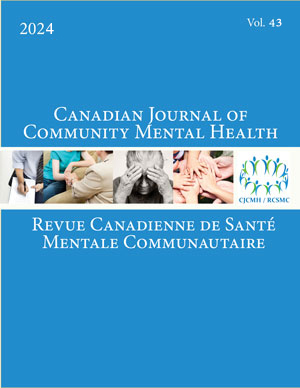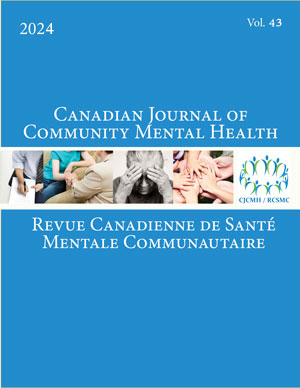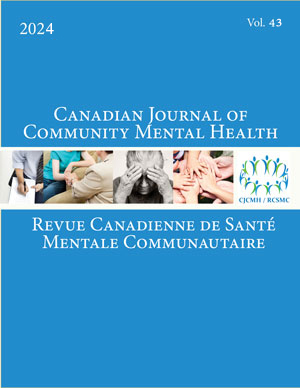Volume 42 • Number 3 • November 2023
Articles
OPEN ACCESS
There is growing evidence that a number of children and youth experience persistent mental health symptoms and repeated service use over time. Collectively, these children and youth are deemed to have “complex mental health needs” and they are the most difficult cases encountered by providers. However, there has been significant confusion surrounding the terminology used to refer to this group and these cases are often defined by their outcomes, impeding identification efforts. This article provides a commentary on current conceptualizations and discusses ways to advance our conceptual understanding of complexity to improve outcomes.
OPEN ACCESS
Patient-oriented health research approaches are growing in popularity; however, there is a lack of literature describing how patient-oriented research is being utilized to enhance mental health programming for students. The current study reports on a participant-oriented approach to development and evaluation of an innovative, holistic, multi-disciplinary program designed to empower post-secondary students to actively maintain their health and well-being and support academic success. Results demonstrated significant increase in self-reported resilience and anxiety symptoms, but no change in depression symptoms. Prevention programs co-designed with intended users show promise as an effective approach to supporting students with sub-clinical mental health challenges.
OPEN ACCESS
Collaborative care models offer an evidence-based approach to address mental health in primary care, yet in Canada its implementation seldom conforms to evidence-based practice. Therefore, we conducted a scoping review to address the question: What are the system-level barriers and enablers to implementing collaborative care models to integrate mental health services in primary care? Inclusion criteria comprised peer-reviewed studies published from 1990–2020. We utilized an implementation science framework to inform our analysis. Our themes included funding; health practitioner workforce/training; and relationships with initiatives, organizations, and communities. This review informs the scaling of collaborative care initiatives that integrate mental health services into primary care.
OPEN ACCESS
Clinical teams working with clients with psychotic disorders have turned to teletherapy to continue offering services to their clients during the Covid-19 pandemic. However, few studies have focused on the challenges of teletherapy by professionals. We conducted a brief online survey with professionals working with clients with a psychotic disorder across Canada. Qualitative analysis of open-ended questions was conducted. Around 86% of the professionals we surveyed began using teletherapy at the beginning of the pandemic. Most professionals (83%) said that they would keep using teletherapy after the end of the pandemic. Numerous advantages and challenges of teletherapy were also discussed.
OPEN ACCESS
Mental health programs are varied in scope and nature; there is little consensus across theoretical background and program content. This review consists of a database search complemented by an environmental scan. The peer-reviewed literature mapped the body of literature on national and international programs embedded in the community. Records (N = 12) on primary studies describing programs were included and complemented by an environmental scan of existing community programs in one Canadian province (N = 16). Most programs were considered effective, psychoeducational in nature, and grounded in positive psychology theory. A promising path forward for promoting mental health is through enhancing mental health literacy (MHL); community MHL programs require further investigation.
OPEN ACCESS
This study explored university students’ perspectives on negotiating and navigating their fluctuating mental health on one specific campus, with particular interest in their experiences of campus-based mental health services. Given the dearth of evidence across paradigms that establishes a concerning prevalence of poor mental health among post-secondary students, this study sought to give voice to students with respect to what changes they felt were most pressing. Seven semi-structured interviews were completed with undergraduate students (second through fourth year) at a mid-sized Canadian institution. Data were analyzed thematically, integrating critical and recovery-oriented social theories. Findings, from the perspective of the students themselves, generated through this process included barriers to help seeking behaviours related to formal services included perceived and actual stigma, lack of confidence in the effectiveness of services, roundabout intake processes, and the perceived need for formal diagnosis as a prerequisite to access. Facilitators to help seeking behaviour related to formal services included quickly developing a positive relationship with a counsellor and access to knowledgeable gatekeepers of mental health services. And finally, informal supports included social support, being meaningfully included and involved in the university environment, recreation, and some forms of substance use.
OPEN ACCESS
Covid-19 has presented challenges to community mental health organizations that have historically almost exclusively delivered in-person services. This study uses qualitative methods to examine the launch of tele-mental health case management delivery in response to the Covid-19 pandemic in a community mental health organization, from the perspectives of case managers and clients. Tele-mental health challenges included access to and use of technology, and limitations of technology. Our findings suggest that tele-mental health case management delivered via the phone and videoconferencing is viewed, for the most part, positively by both clients and case managers, although it cannot fully replicate in-person services.
OPEN ACCESS
Les troubles mentaux sont la principale cause d’invalidité et peuvent présenter une durée d’absence deux fois plus longue, lorsque comparés à d’autres types de maladies. Plusieurs acteurs sont impliqués dans la gestion de l’invalidité dont les médecins de famille (MF) et les psychiatres ; deux acteurs du secteur de la santé incontournables lorsqu’il est question de santé mentale et de retour au travail (RAT). Cet article a comme principal objectif de documenter les tâches des MF et psychiatres liées à la gestion d’une invalidité en raison d’un trouble mental courant (TMC) ainsi que d’identifier les facilitateurs et les obstacles qu’ils perçoivent dans ce processus. De plus, il est question de dégager les besoins de formations qui pourront éventuellement aider ces cliniciens dans l’accomplissement de leurs tâches, permettant par le fait même un rétablissement durable du travailleur. Il s’agit d’une étude qualitative dont la collecte de données a été faite via des groupes de discussion (focus groups) totalisant 3 groupes de MF et 2 groupes de psychiatres (N = 28). Tous les enregistrements ont été retranscrits en verbatim et par la suite codifiés. Les réponses générées par les groupes de discussion ont fait émerger 180 unités thématiques réparties sur 4 grands thèmes, lesquels sont récurrents pour chaque objectif de recherche : (1) évaluer/documenter ; (2) prescrire/traiter ; (3) communiquer/collaborer/réseauter avec les autres acteurs ; et (4) arbitrer/défendre. Les unités thématiques montrent l’importance de la collaboration entre les acteurs et d’une communication efficace entre ces derniers. Il ressort de cela également que ces cliniciens aimeraient être mieux formés pour arrimer connaissances et pratique.









